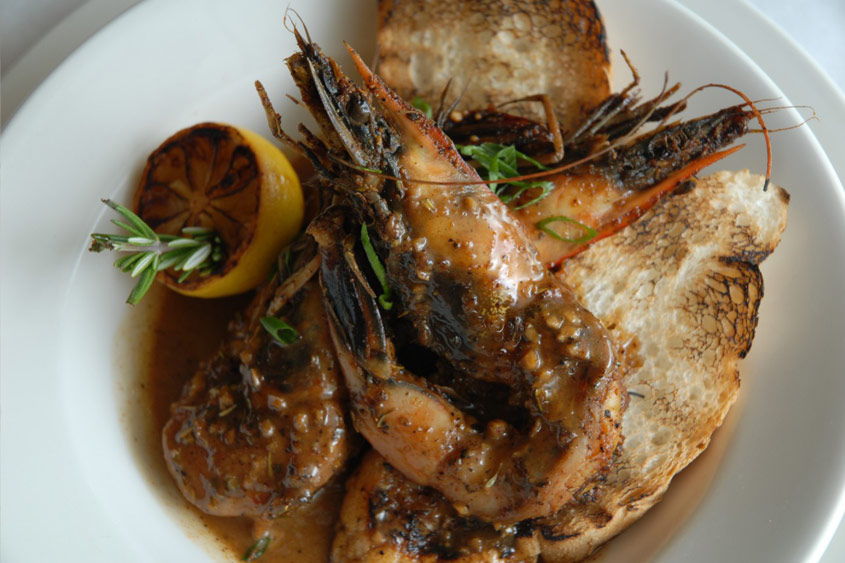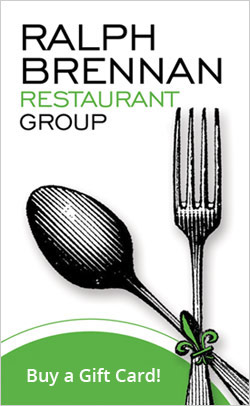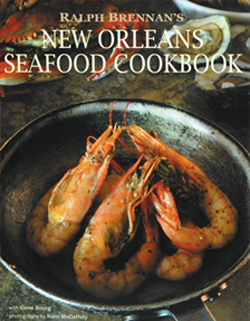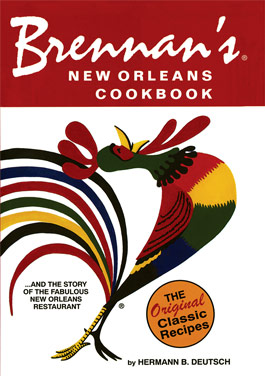- RESERVATIONS
- 504-598-1200
- 115 Bourbon Street
- NEW ORLEANS, LA 70130
BBQ Shrimp

Category: Main Courses
Serving Size: 2
Bbq Shrimp
As featured in Ralph Brennan's New Orleans Seafood Cookbook!
Chef's Notes
This dish is prepared only two servings at a time because increasing the number of shrimp beyond 12 would require increasing the dish’s amount of sauce. Reducing the larger amount of sauce would require more cooking time, resulting in over-cooked shrimp.
Bbq Shrimp
Why this dish goes by the name of barbecue shrimp is anybody’s guess, since it’s not barbecued and it’s not cooked or served with barbecue sauce. The original version is said to have originated in New Orleans’ Italian community a half-century or more ago, to be added to a very long list of the city’s Italian-Creole classics.
Improvisations on the original recipe are many, but no authentic barbecue shrimp dish could be described as dainty, considering the spices called for. Since the shrimp themselves are cooked and served with heads and shells intact, they’re usually eaten as one would eat whole boiled lobster—with a bib and a willingness to use your bare hands. While the head and tail are always removed before eating, many New Orleanians like to retain the shell covering the shrimp meat, as long as the covering is soft and thin enough to chew properly. In this recipe, the emulsified sauce’s richness is a result of combining butterfat with the shrimp’s natural juices, black pepper and worcestershire sauce. The shrimp are cooked just to the point of being done, remaining succulent. And the sauce is a prime candidate for dipping into with crusty bread. Finger lickin’ is optional.
Instructions
*If colossal shrimp are not available, use the largest you can find.
**To coarse-grind the peppercorns, use a blender or peppermill. The grind is important to the taste of the finished dish.
1. Place the unpeeled shrimp, worcestershire, coarsely ground pepper, Creole seasoning, garlic, and 1 tablespoon water in a heavy 10-inch, stainless-steel sauté pan. Squeeze the juice from the lemon half over the shrimp and add the rind and pulp to the pan.
2. Over high heat, cook the shrimp while gently stirring and occasionally turning the shrimp.
3. After about two minutes of cooking, the shrimp should start turning pink on both sides, indicating they are nearly half cooked.
4. If the shrimp are the colossal size, now add 2 tablespoons water to the pan. Otherwise, don’t add water.
5. Reduce the heat to medium-high and continue cooking as you gradually add the cold pieces of butter to the pan. While turning the shrimp occasionally, swirl the butter pieces until they are incorporated into the pan juices, the sauce turns light brown and creamy as it simmers, and the shrimp are just cooked through. This will take about two minutes total if the shrimp are extra-large, and about three minutes total if they’re colossal. Do not overcook the shrimp.
Serving Suggestion: Pour the shrimp and sauce into a heated pasta bowl with the lemon-half turned cut-side down, in the center. Serve the shrimp and sauce immediately, alongside slices of warm, crusty French bread for sopping up the sauce.
Ingredients
- 12 raw colossal shrimp,* unpeeled, with heads and tails left on
- 2 tablespoons worcestershire sauce
- 1 1/2 tablespoons coarsely ground black pepper**
- 2 teaspoons creole seasoning
- 1 teaspoon minced fresh garlic
- 1 to 3 tablespoons water, divided half of 1 lemon, seeded
- 1/2 pound (1 stick) cold, unsalted butter, preferably Plugra or other European-style butter, cut into _-inch cubes
- warm, crusty French bread, for serving
Advanced Steps
SPECIAL EQUIPMENT • A heavy 10-inch stainless-steel sauté pan
Special Equipment
SPECIAL EQUIPMENT • A heavy 10-inch stainless-steel sauté pan
Creole Seasoning
Instructions
Thoroughly combine all the ingredients in a small mixing bowl and place the mixture in an airtight container in a cool, dark place for up to three months.
Ingredients
- For a scant 1 cup
- _ cup sweet paprika
- _ cup kosher salt
- 1 tablespoon freshly ground black pepper
- 1 teaspoon onion powder
- 1 teaspoon garlic powder
- 1 teaspoon ground cayenne pepper
- 1 teaspoon dried thyme leaves
- 1 teaspoon dried oregano leaves
"Top 5 Seafood Restaurants" in New Orleans
- The Daily Meal







